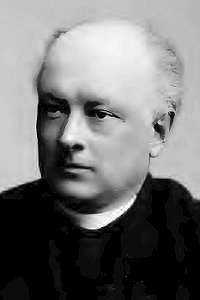Introduction
Born: November 4, 1843, Philadelphia, Pennsylvania.
Died: June 24, 1914, Brookline, Massachusetts.
Buried: Forest Hills Cemetery and Crematory, Jamaica Plain, Massachusetts.

Born: November 4, 1843, Philadelphia, Pennsylvania.
Died: June 24, 1914, Brookline, Massachusetts.
Buried: Forest Hills Cemetery and Crematory, Jamaica Plain, Massachusetts.

William was the son of Richard Newton and Lydia Greatorex, husband of Emily Stevenson Cooke, and nephew of hymnist William Newton.
During the American civil war, he served in Landis’ (Pennsylvania) Battery.
After the war, he attended the University of Pennsylvania (AB 1865, AM 1868, honorary DD 1890), and the Episcopal Divinity School in Philadelphia. He was ordained an Episcopal deacon June 19, 1868, and priest February 19, 1869.
He served as assistant rector at the Church of The Epiphany, Philadelphia (1866–70); minister at the Cathedral Church of St. Paul, Boston, Massachusetts (1877–82); pastor of St. Stephen’s Church, Pittsfield, Massachusetts (1881–1900); chaplain at the English Church in Dinan, Brittany, France (1903–04); and rector at the Church of the Ascension, Wakefield, Rhode Island (1905–06).
Is there a victory then
Over our doubts and our fears?
Is there a passage for men
Out of this valley of tears?
For men who are weary and worn,
Broken, desponding, and sad?
Is there Christ’s smile for earth’s scorn.
Making the sorrowful glad?
Is there a joy for our trust,
A hope and assurance of peace?
Is there a time when our doubts
And temptations forever shall cease?
Is there a morning of light?
A Sabbath of quiet and rest?
When the end of the journey is reached,
And the crown of rejoicing possessed?
Yes! For at last we shall find
The Way, and the Truth, and the Life,
In our Lord, as the end of our search,
In Christ, as the goal of the strife.
Doubt, and temptation, and sin.
And the struggles we wage while we roam;
Will be hushed, in the past, and life’s din
Be forgotten when resting at home.
So there’s a victory then
Over our doubts and our fears;
Faith shall forever give way
To the knowledge which cometh with years
A knowledge of hope changed to sight,
Of trust to fruition made plain;
A life where the will and the power
To love as Christ loveth shall reign.
William Wilberforce Newton
The Voice of St. John and
Other Poems, 1881
On an island in the sea of space,
We walk upon the shifting shore;
We hear the ocean’s ceaseless roar,
And see its waves our steps deface.
We hurry on—we soon are gone;
We scan the undiscovered main—
That ocean all unknown—in vain,
While still the tide is hurrying on!
We are but in our school days here,
With faculties all dwarfed and blunted,
Our highest growth of reason stunted,
When midway in its proud career.
A half a century is man’s,
A thousand years is Nature’s time;
Which in this strange, uneven clime
Is needed to complete their plans!
But when immortal we shall rise,
To study from the Master’s hand,
And with the angels understand
What now is hidden from our eyes—
’Twill be an ever growing bliss
To watch the planets on their way,
With suns and systems, and to say:
Far back on earth I knew of this!
The tablets of our memory
Will shine like plates of burnished steel;
What now is lost, they will reveal,
And what we know not, we shall see!
Yes, we on earth can fit the mind
For higher pleasures yet to come—
When through the worlds of space we roam,
And ever-hidden wonders find.
Thus God has said, Let there be light
;
And what in earth’s dark caves was made
The sooty carbon, has obeyed
His voice, and is the diamond bright.
Light—light is breaking out, and lo!
The problem now is solved; for death,
That darkened cloud, as with one breath,
Is scattered! And the rest, we know!
Then, courage for the field of strife!
The trumpet’s call to arms we hear,
Arouse! awake! oh, never fear
The conflict and the din of life!
William Wilberforce Newton
The Voice of St. John and
Other Poems, 1881